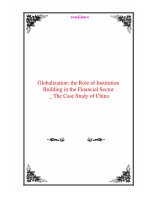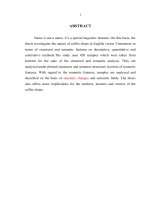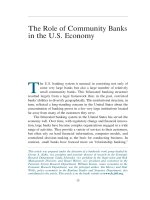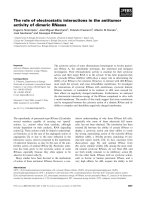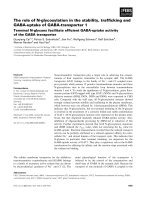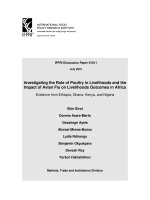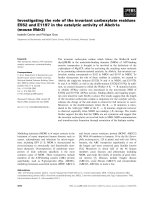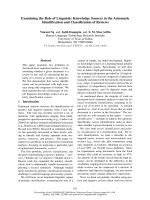Investigating the Role of Metacognitive Knowledge in English Writing ppt
Bạn đang xem bản rút gọn của tài liệu. Xem và tải ngay bản đầy đủ của tài liệu tại đây (116.17 KB, 22 trang )
HKBU Papers in Applied Language Studies Vol. 14, 2010
Investigating the Role of Metacognitive Knowledge
in English Writing
1
Zhang Yanyan
Wuhan University
Abstract
Metacognitive knowledge is knowledge about learning. Recent
research suggests that metacognitive knowledge plays an
important function in cognitive activities concerning language
use and acquisition. This paper aims to investigate the role of
metacognitive knowledge in the English writing of Chinese
EFL learners. The present study involves 120 non-English
major freshmen in China as participants to complete an
English writing task and a self-designed questionnaire on
metacognitive knowledge. It is found that the learners’
metacognitive knowledge base is not strong, metacognitive
knowledge and its three components, i.e., person knowledge,
task knowledge and strategic knowledge, are all positively
correlated with English writing performance, and successful
employment of metacognitive knowledge helps facilitate EFL
learners’ writing proficiency. The results demonstrate that a
good command of metacognitive knowledge can empower EFL
learners in their English writing and cultivate their learning
autonomy in English learning.
1. Introduction
Recent decades has witnessed an increasing recognition of the
importance of metacognitive knowledge in cognitive activities related
to language use and acquisition (e.g., Baker & Brown, 1984; Devine,
1993; Flavell, 1979; Kasper, 1997; Vandergrift, 2002; Wenden, 1998;
Xu & Tang, 2007). Many studies have been carried out to examine the
function of metacognitive knowledge in ESL/EFL learner’s
performance of receptive English skills, such as reading and listening
Zhang: Investigating the Role of Metacognitive Knowledge in English Writing
26
(e.g., Baker & Brown, 1984; Vandergrift, 2002; Xu & Tang, 2007;
Yang & Zhang, 2002). It has been found that the learners’ beliefs and
knowledge about learning play a critical role in those activities.
However, relatively little research has been conducted to investigate
the role of metacognitive knowledge in EFL learner’s performance of
productive English skills, particularly writing, and relevant empirical
studies are especially scarce in the Chinese context (Xu & Tang,
2005). To address the lack, this paper aims to investigate the role of
metacognitive knowledge in the English writing of Chinese EFL
learners, in the hope of shedding some light on the teaching and
learning of EFL writing skill in China.
2. Literature Review
2.1 Metacognitive Knowledge
John Flavell first proposed metacognition theory in the 1970s. He
defined metacognition as knowledge that focuses on or regulates any
part of cognitive activity and identified two general dimensions of
metacognition: knowledge and experience (Flavell, 1979). In his work
Cognitive Development, Flavell (1985) further elaborated that our
metacognitive knowledge base consists of what we have learned
through experience about cognitive activities. From a theoretical
perspective, Wenden (1998, p.517) summarizes the defining
characteristics of metacognitive knowledge as follows:
(1) a part of a learner’s store of acquired knowledge
(2) relatively stable and statable
(3) early developing
(4) a system of related ideas
(5) an abstract representation of a learner’s experience
According to Flavell (1979, 1985), metacognitive knowledge involves
three distinct and highly interactive knowledge variables: person
knowledge, task knowledge, and strategic knowledge.
Person knowledge refers to general knowledge that learners have
Zhang: Investigating the Role of Metacognitive Knowledge in English Writing
27
acquired about themselves as learners, which may facilitate or inhibit
learning. Wenden (1998) suggests that person knowledge may include
cognitive and affective variables such as age, language aptitude, and
motivation, specific knowledge learners have acquired about how
these factors may function in their experience, knowledge about their
proficiency in a certain area, self-efficacy beliefs about their general
ability as learners, and beliefs about their ability to achieve specific
learning goals. With regard to writing in English as a foreign language,
person knowledge may refer to the knowledge EFL learners have
acquired about themselves as writers, such as their attitude towards
and motivation in English writing, their beliefs about their writing
proficiency and their perceived ability to achieve certain writing
objectives.
Task knowledge generally involves three aspects: learners’ knowledge
about the task purpose and how it will meet their learning needs and
goals (Breen, 1987); knowledge about the nature of a particular task
identified through a classification process; information about a task’s
demands, such as the approach to the task and the knowledge and
skills needed to complete the task (Wenden, 1998). In relation to EFL
writing, task knowledge may include learners’ knowledge about the
purpose of a certain writing task, such as to improve their writing
ability, and their information about the required skills to fulfill the
task, such as a good command of English vocabulary and grammar,
and a skillful mastery of developing ideas clearly and logically.
Strategic knowledge refers to general knowledge about the types and
usefulness of strategies, and specific knowledge about their utility for
learning. In second language acquisition, learners’ retrospection upon
their language learning strategies is often taken as evidence of their
stored strategic knowledge (Wenden, 1998). Of particular importance
are metacognitive strategies, which are “general skills through which
learners manage, direct, regulate, guide their learning, i.e. planning,
monitoring and evaluating” (Wenden, 1998, p.519). In the case of
writing in English as a foreign language, strategic knowledge often
refers to EFL learners’ knowledge about pre-writing planning,
on-writing monitoring of errors, post-writing checking and reflection
Zhang: Investigating the Role of Metacognitive Knowledge in English Writing
28
of their writing processes and products.
2.2 Metacognitive Knowledge and English Learning
Research in the past few decades has demonstrated that possession of
a strong metacognitive knowledge base is critical to successful
learning (e.g., Baker & Brown, 1984; Devine, 1993; Flavell, 1979;
Kasper, 1997; Vandergrift, 2002; Xu & Tang, 2007) and that a good
learner is “one who has ample metacognitive knowledge about the
self as learner, about the nature of the cognitive task at hand, and
about appropriate strategies for achieving cognitive goals” (Devine,
1993, p.109).
The recognition of the importance of metacognitive knowledge in
learning has led to an increasing number of relevant studies in the
field of second language acquisition. While extensive research has
been carried out on the role of metacognition in listening and reading
performance of ESL/EFL learners (see Baker & Brown, 1984; Devine,
1993; Yang & Zhang, 2002), corresponding research in writing has
been relatively rare (Devine, 1993), especially in the Chinese context
(Xu & Tang, 2005). A pioneer study on ESL writing in this vein is
Devine, Railey & Boshoff (1993), which attempted to examine the
influence of metacognition on second language writing by
investigating cognitive models in 10 second language and 10 first
language beginning writers and assessing the effects of these models
on their writing performance. The results suggest a potential link
between ESL learners’ metacognitive models and their writing
performance.
Another study on metacognition and writing is Zimmerman &
Bandura (1994), which examined the influence of beliefs that learners
hold about their ability to mobilize and direct resources for learning
and to sustain this effort (i.e. self-efficacy beliefs) on their writing
performance. They proposed a causal model of student self-regulation
of writing achievement, which indicates a close relationship between
metacognitive person knowledge and learners’ writing outcome.
Zhang: Investigating the Role of Metacognitive Knowledge in English Writing
29
Kasper (1997) further explored the metacognitive growth of 67
intermediate level ESL students and 53 advanced level ESL students
from diverse ethnic, cultural, and linguistic backgrounds. She found
that ESL students’ metacognitive growth correlates significantly and
positively with their actual writing performance, along and across the
three components of metacognitive knowledge base.
The above three studies suggest a positive role of metacognitive
knowledge in English writing and have presented an important
contribution to the field. However, all these studies involve
participants of ESL students only. As English has been given a high
priority in the curriculum in China, where there is a large population
of EFL learners, English writing is of great importance for Chinese
students and research on English writing development and instruction
is therefore in urgent need. So far, the studies on metacognition and
writing in the Chinese context have been rather rare, and empirical
studies are especially scarce (Xu & Tang, 2005). Lu (2006) is an
earliest study that explored the relationship between metacognitive
strategies and English writing, but the participants of this study were
senior English major students and thus cannot represent non-English
majors who far outnumber English majors in China. Another more
recent study of relevance is Xu & Tang (2007), which compared 5
successful and 5 unsuccessful Chinese EFL writers’ metacognitive
knowledge by using think-aloud protocols and interviews. They found
that good writers are superior to poor ones in metacognitive
knowledge and attribute the good writers’ success to their possession
of a better metacognitive knowledge base. Although insightful, Xu &
Tang’s study is a qualitative analysis of only a few non-English major
students’ metacognitive knowledge and its generalizability therefore
awaits further confirmation.
From the review of previous studies, we notice a few research gaps in
this field. First, the research on the relationship between
metacognition and writing is still relatively rare, and the existing
studies tend to focus on ESL contexts. Second, empirical studies of
large scales are limited, especially in the Chinese context. Third, the
previous studies have seldom controlled the influence of English
Zhang: Investigating the Role of Metacognitive Knowledge in English Writing
30
proficiency on English writing. Fourth, both Devine et. al.’s (1993)
proposed link between metacognitive knowledge and writing
performance and Zimmerman & Bandura’s (1994) causal model on
writing achievement need proofs from other studies. To address the
lack, the present study undertakes an investigation of the role of
metacognitive knowledge in the English writing of 120 non-English
major EFL learners in Mainland China. The specific research
questions are as follows:
(1) What is the current situation of Chinese EFL writers’
metacognitive knowledge base and its three components?
(2) What’s the relationship between metacognitive knowledge
and English writing?
(3) Can the development of metacognitive knowledge help facilitate
English writing?
In addition, this research also intends to explore the relationship
between metacognitive knowledge and English writing by controlling
English proficiency so as to formulate an influence route model of
metacognitive knowledge on English writing.
3. Research Design
3.1 Participants
The participants of this study involve 120 freshmen from 4 intact
English classes across various non-English majors, including
chemistry, physics, surveying, mathematics, management, accounting,
etc., in a key university in Mainland China. There are 68 males and 52
females. When the study was carried out, the students were at the
beginning of their second semester in university, so all the students
have been learning English for at least six years. According to the
teaching syllabus of college English in China, first-year university
students should be able to write an English essay of 150 to 200 words
within thirty minutes.
Zhang: Investigating the Role of Metacognitive Knowledge in English Writing
31
3.2 Instruments
(1) Metacognitive Knowledge Questionnaire
Questionnaires have often been used in previous research on learners’
metacognitive knowledge in English reading, listening and writing
performance, and have been proved to be an effective tool to study
metacognition. Borrowing insights from theoretical discussions on the
concept of metacognitive knowledge (e.g., Wenden, 1998) and
previously used questionnaires (see Pajares, Hartley & Valiante (2001)
for writing self-efficacy questionnaire; Lu (2006) for metacognitive
strategies questionnaire), the author of the present paper designed a
metacognitive knowledge questionnaire on English writing in the
Chinese context. The questionnaire consists of two sections, with the
first aiming to gather the participants’ basic information, such as the
scores of their College English course
2
in the first semester, and the
other intending to illicit the learners’ retrospection upon their stored
knowledge about English writing, including person knowledge, task
knowledge, and strategic knowledge. The section on metacognitive
knowledge has 34 items in total, all designed on a five-point Likert
scale. Each item is a statement concerning an aspect of metacognitive
knowledge, accompanied with five response options ranging from five
to one corresponding to from “strongly agree” to “strongly disagree”.
For instance, “I think my English writing is good compared with my
peers”. Learners were asked to judge every statement and select a
choice that suits them best. Among all the items, items 1 to 14 are
concerned with person knowledge, items 15 to 22 with task
knowledge, and item 23 to 34 with strategic knowledge
3
. The internal
reliability alpha reaches 0.89 for person knowledge, 0.81 for task
knowledge, and 0.87 for strategic knowledge. To ensure that the
participants fully understand the items so that their answers can best
represent their true ideas, two versions of the same questionnaire were
designed, with the Chinese one for the students and the English one
for writing this paper.
Zhang: Investigating the Role of Metacognitive Knowledge in English Writing
32
(2) English Writing
To gather data on their English writing, the participants were required
to write an English composition on the topic “Part-time Job” within
thirty minutes during regular class time. The composition should be
no less than 100 English words, following the writing practice of
CET4
4
in China. “Part-time job” is a popular topic in universities in
Mainland China and was thus chosen for writing so that the students
would not feel too difficult and could display their English writing
ability.
(3) English Proficiency Test
All the participants have just taken a College English test, along with
the other freshmen, at the end of their first semester, which is also
their first English test in university. The test consists of listening
comprehension, vocabulary and grammar, reading comprehension,
translation and writing, and has been graded by English teachers
according to the same criteria
5
. This test was therefore adopted as the
English proficiency test for our research, and the students’ scores were
collected as an indicator of their current English proficiency.
3.3 Data Collection and Analyses Procedures
The research was carried out at regular English teaching hours with
the help of the participants’ teachers. For fear that the questionnaire
might affect the students’ writing process, the English writing task
was assigned first, followed by the metacognitive questionnaire. It
took about 40 minutes for all the participants to complete the writing
task and fill up the questionnaire.
Each English composition was scored independently by two
experienced English teachers, following the same grading criteria as
in CET 4, with the full mark being 15 points. The inter-rater reliability
is over 0.9. The average of the two scores for each composition was
adopted as its final grade. Whenever the two scores of a composition
disagreed by three points or above, the two raters would examine it
Zhang: Investigating the Role of Metacognitive Knowledge in English Writing
33
again and reach a final agreement after consideration.
As all the metacognitive knowledge items are on a five-point Likert
scale, with the options ranging from “strongly agree” to “strongly
disagree”, the options were given values from 5 to 1 accordingly. The
criteria for judging the average metacognitive knowledge level are
shown in the following Table 1.
Table 1: Grading criteria of metacognitive knowledge level
Metacognitive knowledge level Mean Options
4.5-5.0 Strongly agree
High
3.5-4.4 Agree
Medium 2.5-3.4 Uncertain
1.5-2.4 Disagree
Low
1.0-1.4 Strongly disagree
All the data, including those of the writing performance,
metacognitive knowledge and English proficiency, were typed into
computer. SPSS (Statistical Package for Social Science) programme
was then run to undertake statistical analyses. To serve the purposes of
the present study, the following analyses were carried out step by step:
(1) descriptive analyses of each of the variables concerning
metacognitive knowledge;
(2) correlation analyses between the participants’ metacognitive
knowledge and their English writing performance;
(3) an independent-samples t-test of the English writing
performance between students with different metacognitive
knowledge statuses as well as an independent-samples t-test of
the metacognitive knowledge status between students with
different writing performance;
(4) regression analyses for a close examination of the influence of
metacognitive knowledge on English writing by controlling
the English proficiency variable.
4. Results
4.1 Descriptive Analyses
Table 2 presents the average score (Mean) and the standard deviation
Zhang: Investigating the Role of Metacognitive Knowledge in English Writing
34
(Std. Deviation) of each intended aspect concerning metacognitive
knowledge together with its corresponding item number in the
questionnaire.
Table 2: Descriptive statistics of each metacognitive knowledge variable
Person Knowledge N Mean
Std.
Deviation
1. Positive attitudes towards English writing 120 3.14 1.08
2. Beliefs on English writing proficiency 120 2.85 .82
3. Beliefs on English writing achievement 120 4.05 .65
4. Beliefs on overcoming writing difficulties 120 3.55 .67
5. English writing motivation 120 3.36 1.09
6. Self-efficacy of ability in word spelling 120 2.68 .65
7. Self-efficacy of ability in using punctuations 120 3.18 .85
8. Self-efficacy of ability in using word class 120 2.82 .85
9. Self-efficacy of ability in using English grammar 120 2.95 .79
10. Self-efficacy of ability in writing topic sentences 120 3.68 .89
11. Self-efficacy of ability in writing supporting details 120 3.64 .79
12. Self-efficacy of ability in writing endings 120 3.45 .91
13. Self-efficacy of ability in thesis organization 120 3.32 .99
14. Self-efficacy of ability in expressing ideas 120 3.68 .78
Task Knowledge N Mean
Std.
Deviation
15. Familiarity with the writing topic 120 3.38 1.07
16. English writing task purpose 120 4.15 .73
17. Demands for a large vocabulary 120 2.82 .86
18. Demands for proficient grammar 120 2.68 .94
19. Demands for clear expression 120 3.95 1.06
20. Demands for good organization 120 3.75 .96
21. Demands for rich contents 120 3.60 .94
22. Demands for originality 120 3.20 1.16
Strategic Knowledge N Mean
Std.
Deviation
23. Knowledge on pre-writing planning 120 3.79 1.19
24. Thinking from readers' perspective 120 2.21 1.03
25. Knowledge on on-writing monitoring 120 3.74 1.07
26. Using avoidance strategies in writing exams 120 3.99 1.05
27. Seeking help in times of difficulty 120 2.07 .87
28. Knowledge on post-writing checking 120 3.42 1.04
29. Checking spelling 120 3.58 1.21
30. Checking grammar 120 3.64 1.09
31. Checking expression 120 2.15 .95
32. Checking organization 120 2.56 1.04
33.Checking content 120 2.76 .98
34.Knowledge on after-writing reflection 120 2.21 1.22
Table 3 summarizes the results of the three components of
metacognitive knowledge and the overall metacognitive knowledge
Zhang: Investigating the Role of Metacognitive Knowledge in English Writing
35
status of the participants.
Table 3: Descriptive statistics of metacognitive knowledge
Knowledge N Mean Std. Deviation
Person knowledge 120 3.31 .82
Task knowledge 120 3.44 .67
Strategic knowledge 120 3.01 .74
Metacognitive knowledge 120 3.25 .58
Table 4 presents the results of the writing performance and the
English proficiency.
Table 4: Descriptive statistics of writing performance and English proficiency
N Mean Std. Deviation
English Writing 120 9.45 1.85
English Proficiency 120 77.49
6
10.79
4.2 Correlation Analyses
The results of correlation analyses between metacognitive knowledge
and English writing are shown in Table 5.
Table 5: Correlation analyses between metacognitive knowledge and English writing
English
Writing
Person
Knowledge
Task
Knowledge
Strategic
Knowledge
Metacognitive
Knowledge
English Writing 1 .485(**) .242(**) .239(**) .378(**)
Person Knowledge 1 .379(**) .233(*) .529(**)
Task Knowledge 1 .093 .475(**)
Strategic Knowledge 1 .898(**)
Metacognitive
Knowledge
1
** Correlation is significant at the 0.01 level (2-tailed).
Table 6 presents the results of correlation analyses between three
factors: metacognitive knowledge, English writing, and English
proficiency. It is found that metacognitive knowledge positively
correlates not only with English writing (r=.378, p<.01), but also with
English proficiency (r=.361, p<.01). Moreover, English writing is also
positively correlated with English proficiency (r=.640, p<.01).
Zhang: Investigating the Role of Metacognitive Knowledge in English Writing
36
Table 6: Correlation analyses between English writing, metacognitive
knowledge and English proficiency
English
Writing
Metacognitive
Knowledge
English
Proficiency
English Writing 1 .378(**) .640(**)
Metacognitive Knowledge 1 .361(**)
English Proficiency 1
** Correlation is significant at the 0.01 level (2-tailed).
4.3 T-test Analyses
To testify the influence of metacognitive knowledge on English
writing, an independent-samples t-test of the English writing
performance between students with different metacognitive
knowledge base was carried out. To ensure that the numbers of
students representing different metacognitive knowledge levels are
balanced, the mean value 3.25 was chosen as the cut point for
metacognitive knowledge status. The results are demonstrated in
Table 7. Among 120 participants, 59 students whose metacognitive
knowledge status is above or equal to 3.25 have a mean writing score
of 10.00 while the other 61 students whose metacognitive knowledge
status is below 3.25 have a mean writing score of 8.93. The difference
between the writing scores of the two groups reaches a statistical
significance (p=.001). This result indicates that students with different
metacognitive knowledge statuses perform significantly differently in
the writing task; students with a higher metacognitive knowledge base
also do better in their English writing.
Table 7: t-test of English writing with different metacognitive knowledge statuses
Group N Mean Std. Deviation t Sig. (2-tailed)
>= 3.25 59 10.00 1.72 3.30 .001
English Writing
< 3.25 61 8.93 1.84
Table 8 presents the t-test results of the metacognitive knowledge of
students at different English writing levels. The participants were
divided into two groups by adopting their average English writing
grade (Mean=9.45) as the cut point. Among 120 participants, 58
students whose writing is above or equal to the average have a mean
metacognitive knowledge value of 3.31 while the other 62 students
whose writing is below the average have a mean metacognitive
knowledge value of 3.20. The difference between the metacognitive
Zhang: Investigating the Role of Metacognitive Knowledge in English Writing
37
knowledge statuses of the two groups also reaches a statistical
significance (p=.000). The t-test result indicates that students with a
higher English writing proficiency often have a stronger
metacognitive knowledge base.
Table 8: t-test of metacognitive knowledge with different English writing levels
Group N Mean Std. Deviation t Sig. (2-tailed)
>= 9.45 58 3.31 0.72 3.61 .000
English Writing
< 9.45 62 3.20 0.65
4.4 Regression Analyses
The results of correlation analyses above have shown that
metacognitive knowledge, English proficiency, and writing
performance are all positively correlated with each other. To further
examine the relationships between the three variables, regression
analyses were carried out by taking English writing as the dependent
variable and metacognitive knowledge and English proficiency as the
independent variables. This is to investigate how metacognitive
knowledge and English proficiency may influence English writing.
The results are presented in Table 9.
Table 9: Regression analysis of metacognitive knowledge, English proficiency,
and English writing
Standardized
Coefficients
Model
Beta
t Sig.
Metacognitive Knowledge .169 2.268 .025
English Proficiency .578 7.754 .000
From the above table, we can draw a standard regression equation as
follows:
English Writing = 0.578 * English Proficiency + 0.169 * Metacognitive
Knowledge
The correlation analyses also indicate that metacognitive knowledge
influences English proficiency. So a second regression analysis was
carried out by taking English proficiency as the dependent variable
and metacognitive knowledge as the independent variable. This is to
Zhang: Investigating the Role of Metacognitive Knowledge in English Writing
38
investigate to what extent metacognitive knowledge exerts influence
on English proficiency. The result is presented in Table 10.
Table 10: Regression analysis of metacognitive knowledge and English proficiency
Standardized
Coefficients
Model
Beta
t Sig.
Metacognitive Knowledge .361 4.209 .000
From Table 10, we can write another equation as follows:
English Proficiency = 0.361 * Metacognitive Knowledge
The above two equations demonstrate to us in accurate figures that
metacognitive knowledge influences both English writing and English
proficiency directly. Moreover, metacognitive knowledge also exerts
its influence on English writing indirectly by influencing English
proficiency. We therefore can draw the following route chart to show
these influences.
Chart 1: Influence route chart of metacognitive knowledge on English writing
Metacognitive Knowledge 0.169
English Writing
0.361
0.578
English Proficiency
5. Discussion
5.1 Metacognitive Knowledge Status of Chinese EFL Learners
The descriptive statistics results of the participants’ metacognitive
knowledge variables as reported in Tables 2 and 3 demonstrate that
the students’ metacognitive knowledge status, on the whole, is far
from being satisfactory (Mean=3.25), belonging to the medium level.
Among the three components of metacognitive knowledge, task
knowledge ranks the highest (Mean= 3.44), person knowledge ranks
the second (Mean=3.31) and strategic knowledge falls behind, merely
above 3 (Mean=3.01). These findings suggest that although the
Zhang: Investigating the Role of Metacognitive Knowledge in English Writing
39
students have had some awareness to employ metacognitive
knowledge in English writing process, their metacognitive knowledge
base is, however, not very strong.
In general, our learners haven’t taken the role of a writer in their
English writing process and don’t have much self-efficacy in their
writing performance. To be specific, on average, they don’t like
English writing very much (Mean=3.14), and don’t have much
confidence in their English writing proficiency (Mean=2.85). Their
self-efficacy of the ability in the correct use of word spelling, word
class and English grammar are all toward the lower end of medium
level (Mean=2.68, 2.82, 2.95, respectively). Nevertheless, it is a
comforting discovery that our learners have a strong positive belief of
their English writing achievement (Mean=4.05) and their ability to
overcome writing difficulties (Mean=3.55) in the long run.
The results of task knowledge indicate that our learners are quite
familiar with the writing topic (Mean=3.38) and are highly clear about
the purpose of English writing (Mean=4.15). Moreover, our
participants have a fairly good knowledge of the demands for an
excellent piece of English writing in terms of clarity (Mean=3.95),
organization (Mean=3.75), and content (Mean=3.60). In contrast, the
learners are less concerned about vocabulary (Mean=2.82), grammar
(Mean=3.20) and originality of their writing (Mean=3.20). On the
whole, the learners have a relatively high command of task knowledge
in the writing process.
The learners’ strategic knowledge is the poorest among the three
components of metacognitive knowledge. The descriptive results
show that our learner writers seldom consider from readers’
perspective (Mean=2.21) and rarely check their writing concerning
clarity (Mean=2.15), organization (Mean=2.56) and content (2.75). In
times of difficulty, they tend to use avoidance strategies, especially
during exams (Mean=3.99) and are reluctant to seek help from others
or dictionaries (Mean=2.07). In addition, they seldom reflect upon
their English writing once it is finished (Mean=2.21). All these factors
have contributed to the low level of our learners’ strategic knowledge.
Zhang: Investigating the Role of Metacognitive Knowledge in English Writing
40
In order to explore the causes for the students’ poor metacognitive
knowledge in English writing, we undertook an informal interview
with a few participants afterwards, in which some learners confess
that,
(1) “I have a lot of difficulties in expressing myself, so I don’t like
writing in English”;
(2) “I feel my English writing is so poor that I don’t have a sense of
achievement after writing”;
(3) “I have no confidence in myself and have become disinterested”;
(4) “I have nothing to write about”;
(5) “I don’t feel that English writing is important and so I don’t want
to spend time on it”.
The above retrospections are consistent with our quantitative findings
that learners have low self-efficacy in English writing. Their negative
beliefs of their ability in using English and their frequent monitoring
of errors concerning spelling and grammar found in this study suggest
that poor English proficiency may be a strong cause for our learners’
poor metacognitive knowledge, particularly person knowledge.
Moreover, English compositions are often assigned by teachers as
homework in China, which students are required to write irrespective
of their attitude towards and interest in English writing. Some students
may not be interested in writing activities at all; some may start with
high spirits, but their interest and motivation gradually lose with
constant frustrations in trying to express themselves due to the lack of
vocabulary, grammar and effective strategies.
5.2 Correlation of Metacognitive Knowledge and English Writing
The results of correlation analyses demonstrate that there is a positive
and significant correlation between metacognitive knowledge and
English writing performance (r=.378, p<.01). Among the three
components of metacognitive knowledge, person knowledge has the
highest correlation value with English writing (r=.485), task
knowledge the second (r=.242) and strategic knowledge the third
Zhang: Investigating the Role of Metacognitive Knowledge in English Writing
41
(r=.239), and all the three correlations are significant at the 0.01 level
(2-tailed). The findings of the present study corroborate those of the
previous research (Devine et. al., 1993; Kasper, 1997). Thus, the
answer to our second research question is metacognitive knowledge
correlates positively and significantly with EFL learners’ English
writing.
The highly positive and significant correlation between learners’
person knowledge and their English writing performance suggests that
higher self-efficacy may lead to more efforts and better performance.
This inference, to some extent, testifies the causal model of student
self-regulation of writing achievement proposed by Zimmerman &
Bandura (1994). “Learners who believe they can regulate their writing
and maintain their efforts to do so (self-efficacy beliefs) will be
inclined to believe they can learn to write (achievement beliefs) and
set stringent evaluative criteria for themselves. This, in turn, leads
them to aim for high grades. Learning outcomes (their final grades),
according to the model, are directly related to these last three factors,
i.e. their achievement beliefs, evaluation criteria, learning goals, and
indirectly related to their beliefs about self-efficacy” (Wenden, 1998,
p.521). Given this correlation, the learners’ unsatisfactory person
knowledge in writing (Mean=3.31) calls our attention to the
improvement of person knowledge.
The correlation between task knowledge and English writing
performance is also positive and significant. The participants in this
study show a relatively high task knowledge base. This is certainly
good news for our teachers of English in China, but we should not
ignore the fact that some aspects of task knowledge are rather weak
and need to be further enriched, such as knowledge on the demands
for originality in successful English writing.
The correlation between strategic knowledge and writing performance
is again positive and significant. However, the average level of our
students’ strategic knowledge is only 3.01, suggesting that our
students, on the whole, have a relative poor knowledge about the use
of writing strategies. Although they have a fairly good awareness to
Zhang: Investigating the Role of Metacognitive Knowledge in English Writing
42
plan their writing beforehand and monitor their writing process, they
have little knowledge of thinking from readers’ perspectives and
reflecting upon their writing afterwards. The students’ rare reflection
of their writing after the task is finished can be attributed to their lack
of interest and motivation in writing, especially among those who
write English compositions not out of interest, but as a demand from
teachers.
From Table 5, we notice that among the three components of
metacognitive knowledge, strategic knowledge correlates the most
highly with the overall metacognitive knowledge (r=.898), and person
knowledge (r=.529) ranks the second. However, our students are weak
at both strategic knowledge and person knowledge. It is thus
important that our teachers should raise students’ self-awareness of
person and strategic knowledge in English writing, find ways to help
enrich their knowledge as a writer and strategy user, and eventually
help to improve their English writing ability.
5.3 The Influence of Metacognitive Knowledge on English Writing
The results of the two independent-samples t-tests indicate that
students with a higher English writing proficiency often have a
stronger metacognitive knowledge base and that students with a better
metacognitive knowledge status often have a higher English writing
proficiency. These findings suggest that students’ metacognitive
knowledge exerts positive influences on their English writing
performance, consistent with previous research (e.g., Xu & Tang,
2007). Through a qualitative analysis, Xu and Tang (2007) found that
successful writers are superior to unsuccessful ones in the three
components of and the overall metacognitive knowledge. The present
study further testifies the important role of metacognitive knowledge
in English writing.
The results of correlation and regression analyses demonstrate that
metacognitive knowledge exerts positive influences not only on
English writing, but also on English proficiency. More specifically,
the influence route chart obtained in the present study clearly
Zhang: Investigating the Role of Metacognitive Knowledge in English Writing
43
indicates that metacognitive knowledge exerts an indirect positive
influence through English proficiency as well as a direct positive
influence, on English writing performance.
It should be emphasized that metacognitive knowledge also plays an
important role in English learning. This finding is in line with earlier
studies that metacognitive knowledge helps facilitate English learning
in general. We therefore conclude that developing students’
metacognitive knowledge can help increase their English proficiency,
including English writing skills.
It is well known that developing English writing competence presents
a great challenge to ESL/EFL learners and falling behind required
levels for writing proficiency may hinder them from normal study
(Kasper, 1997). English writing has also been a notoriously difficult
skill for Chinese learners of English. Therefore, the facilitating effects
of metacognitive knowledge on writing can be fully exploited to help
ESL/EFL students. Educators should include the instruction of
metacognitive knowledge as a component of teaching programs (e.g.,
Chamot & O’Malley, 1994; Cohen, 1998; Holec, 1994). Specifically,
teachers of English can design activities to help increase students’
motivation and self-efficacy in writing, namely, to improve their
person knowledge. Teachers can also provide instruction in the use of
cognitive and metacognitive strategies to strengthen students’ strategic
knowledge and skills for autonomous learning. Moreover, it is
important to raise students’ awareness of the specific strategies that
can be employed in the writing process, such as to think from readers’
perspectives, to reflect upon their writing, and to revise their
compositions for improvement.
6. Conclusion
This paper explored the role of metacognitive knowledge in the
English writing of Chinese EFL learners. By analyzing the data
collected from an English writing task and self-designed
questionnaires on metacognitive knowledge, this study has obtained
the following major findings:
Zhang: Investigating the Role of Metacognitive Knowledge in English Writing
44
(1) Chinese EFL learners’ metacognitive knowledge of English
writing, on average, is not satisfactory.
(2) There is a positive and significant correlation between
metacognitive knowledge and English writing.
(3) Metacognitive knowledge influences students’ English writing;
developing students’ metacognitive knowledge helps increase their
writing proficiency.
The present study has several important pedagogical implications. As
Chinese EFL learners, on the whole, don’t have a high metacognitive
knowledge status, there is an urgent need to raise the learners’
metacognitive awareness to facilitate their English writing skill. Since
metacognitive knowledge correlates significantly and positively with
English writing, it is necessary for teachers to provide instructions to
cultivate learners’ metacognitive knowledge in English class.
Metacognitive knowledge has been found to exert positive influences
not only on English writing, but also on English proficiency.
Therefore, offering metacognitive knowledge instruction, especially
strategic knowledge, can also help to increase EFL learners’ overall
English proficiency.
This study suffers from several drawbacks. First, metacognitive
knowledge may increase with appropriate instruction; therefore,
longitudinal as well as cross-sectional studies need to be carried out to
investigate the metacognitive growth of EFL learners. Second, the
major instrument for collecting metacognitive knowledge data was
questionnaire in this research. Other methods, such as “Think-aloud”,
can be adopted to gather learners’ introspective as well as
retrospective data. Third, the participants of the present study are
exclusively Chinese learners of English. EFL learners from other first
language backgrounds should also be examined to test the
generalizability of the positive correlation between metacognitive
knowledge and English writing found in this study.
In conclusion, a better command of metacognitive knowledge can
empower learners in English writing and cultivate their autonomous
Zhang: Investigating the Role of Metacognitive Knowledge in English Writing
45
English learning. The limitations of the present study suggest the
direction for further research in future.
Notes
1. The study has been supported by National Funds for Social Science (“Study of the
Development of Chinese Students’ Genre Competence”, Project No.:10BYY088), by
“Fundamental Research Funds for the Central Universities” (Post-70s Young Scholar
Research Funds at Wuhan University) and Doctor Research Funds of Wuhan University
(Project No.: 102276369).
2. Non-English major students in Mainland China are usually offered one English course,
called College English, in the first two years at university.
3. Interested readers may refer to Table 2 for the detailed information on the intended aspects
of metacognitive knowledge and their corresponding item numbers in the questionnaire.
4. CET4, namely, College English Test, Band 4, is a national English proficiency test for
non-English major students in Mainland China. Its reliability and validity has long been
established by researchers, and this test has been widely used in research as a benchmark test.
5. The teachers are said to have marked the test papers together and each was responsible for
certain items.
6. The full mark for the English proficiency test is 100.
References
Baker, L., & Brown, A. L. (1984). Metacognitive skills and reading. In P. D. Pearson, (Ed.),
Handbook of reading research (pp. 354-394). New York: Longman.
Breen, M. P. (1987). Learner contributions to task design. In C. N. Candlin, & D. Murphy,
(Ed.), Language learning tasks: Lancaster practical papers in English language
education. London, UK: Prentice Hall International.
Chamot, A., & O’Malley, J. M. (1994). Language learner and learning strategies. In N. C.
Ellis, (Ed.), Implicit and explicit learning of languages. London: Academic Press.
Cohen, A. (1998). Strategies in learning and using a second language. London: Longman.
Devine, J. (1993). The role of metacognition in second language reading and writing. In J. G.
Carson, & I. Leki, (Eds.), Reading in the composition classroom: Second language
perspectives (pp. 105-127). Boston: Heinle and Heinle.
Devine, J., Railey, K., & Boshoff, P. (1993). The implications of cognitive models in L1 and
L2 writing. Journal of Second Language Writing, (2), 203-225.
Zhang: Investigating the Role of Metacognitive Knowledge in English Writing
46
Flavell, J. H. (1979). Metacognition and cognitive monitoring: A new area of
cognitive-developmental inquiry. American Psychologist, 34, 906-911.
Flavell, J. H. (1985). Cognitive development (2nd ed.). Englewood Cliffs, NJ: Prentice-Hall.
Holec, H. (1994). Self-directed learning: An alternative form of training. Strasbourg: Council
for Cultural Cooperation, Council of Europe.
Kasper, L. F. (1997). Assessing the metacognitive growth of ESL student writers. TESL EJ,
3(1), 1-20.
Lu, W. J. (2006). Relationship between metacognitive strategies and English writing. Foreign
Languages and Their Teaching, (9), 25-27.
Pajares, F., Hartley, J. & Valiante, G. (2001). Response format in writing self-efficacy
assessment: Greater discrimination increases prediction. Measurement and Evaluation in
Counseling and Development, 33, 214-221.
Vandergrift, L. (2002). It is nice to see that our predictions were right: Developing
metacognition in L2 listening comprehension. The Canadian Modern Language Review,
58, 555 - 575.
Wenden, A. L. (1998). Metacognitive knowledge and language learning. Applied Linguistics,
19(4), 515-537.
Xu, J. F. & Tang F. (2005). Review of previous research on English writing metacognition in
China and abroad. Foreign Language World, (5), 17-23.
Xu, J. F. & Tang F. (2007). A study of differences in the metacognitive knowledge of good
and poor English writers. Journal of PLA University of Foreign Languages, 30(6),
44-48.
Yang X. H. & Zhang, W. P. (2002). The correlation between metacognition and EFL reading
comprehension of Chinese college students. Foreign Language Teaching and Research,
34(3), 213-218.
Zimmerman, B. J. & Bandura, A. (1994). Impact of self-regulatory influences on writing
course attainment. American Educational Research Journal, 31, 845-62.
About the author
Zhang Yanyan is currently an associate professor at the School of Foreign Languages and
Literature at Wuhan University in P. R. China. Her research interests mainly include second
language acquisition, applied linguistics, corpus linguistics and world Englishes.
E-mail:

